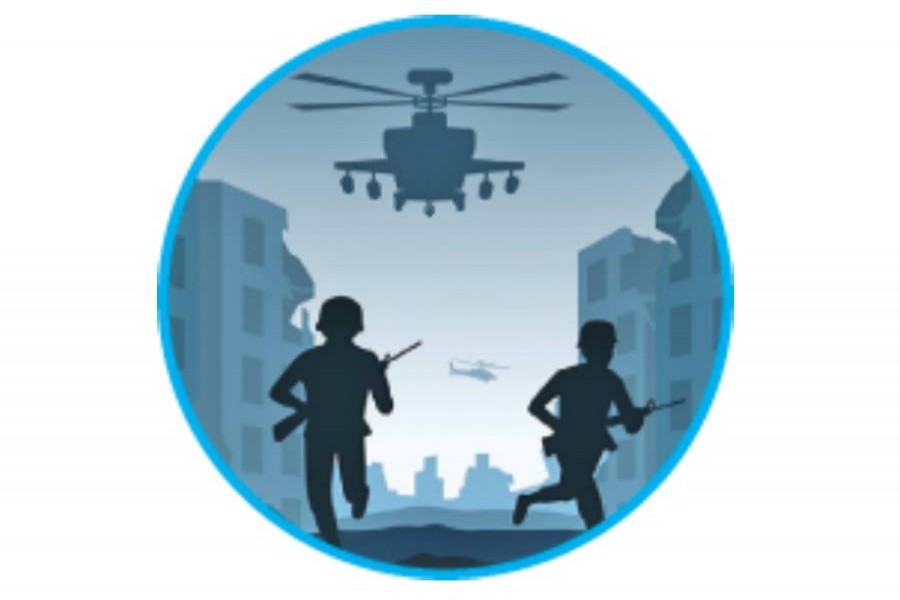Bangladesh needs to have its policies right in a world that is constantly in a state of flux. Though the world, so far as big power politics is concerned, has always seen changes, those cannot be compared to what is happening in modern times. In fact, technology has been playing a big part in modern changes in world politics and economy. Its pace is so fast that even traditional big powers are finding it hard to cope with.
Consider the latest European war in Ukraine where despite its military might , Russia, has, to be frank, found itself in a quagmire. Who could think that small, non-descript unmanned drones could cause huge problems to its advancing columns in Ukraine?
Again, could one ever imagine that some goat-herders with guns would drive away the world's greatest military power, America, from Afghanistan only a year back?
Or to think that Israel, a regional power in the Middle East, is at the end of its tether to control the Hamas or other guerillas with their rockets in the Gaza strip!
But there is also no room for complacency among smaller nations that small weapons can make big impacts on wars.
So, when small shoulder-held missiles throwers brought down the pride of Western fighter planes recently in Afghanistan or in Syria in 1973, hectic researches went on to deter those through developing electronic jamming technologies.
At the same time, with the advances in Information Technology (IT), the power of surveillance of enemy movement has also grown at an unprecedented pace. And it is not only in the war field, the surveillance technology is now a big weapon in the hands of the authoritarian rulers who hate any dissent from public space.
But at the same time, similar technologies are helping the common people to snoop around and spread through social media political shenanigans of the powers that be.
Hence is the constant playing of the game of cat and mouse between the big and small powers as well as the authoritarian state and the public.
So, it is quite a different world from what the older generation witnessed even a few decades back. What is most urgent in this situation is to be able to keep pace with the rest of the world. Has Bangladesh been doing that so far? Has it made necessary public investments or been able to attract adequate private capital in the IT sector?
Whenever one talks about technology, the picture of big, costly machines often pops up in our mind's eye. But for IT, more important is the development of trained people in the sector. It is well-trained IT professionals who are going to lead the next phase of Industrial Revolution fondly termed 4IR or Fourth Industrial Revolution.
But who is to lead that phase of change in technology, economy and society?
Not necessarily, the traditional big powers. The nation giving the highest priority to creating an efficient IT manpower, will be in the lead. And thanks to the internet, people from any corner of the globe can now have access to the latest development in information technology including artificial intelligence.
On this score, it is learnt that Bangladesh has a plan to achieve a hundred per cent literacy rate by 2030 to meet the UN's Sustainable Development Goal (SDG). To that end the International Literacy Day was observed on Thursday, September 08. And the theme of the day was 'Transforming Literacy Learning Spaces'.
But have the authorities also been able to define the learning space they want to transform?
In the present context, apart from understanding printed words, the learner should also be able to handle IT devices including computer and smart phones. But smart phone is now in every hand and even children can operate these IT devices and communicate with those. There is no especial training required to operate these IT gadgets.
However, for people who want to grow into professionals, especial training would be required to learn the languages that run the IT machines.
The government's curriculum to achieve 100 per cent literacy should, therefore, remain incomplete if some basics on IT are not included in it. Obviously, inclusion of IT-related course in the literacy programme would require involvement of trainers equipped with the knowledge of IT.
First and foremost, what is most important here is to dispel any fear among the learners about the inner workings of these IT devices. Another important aspect of this IT lessons will be learning of English since this is the language of technology, let alone IT.
So, the basics of English and IT should be the ingredients of any literacy programme.
People, who would show keen interest in IT-related aspects of the literacy programmes, should be selected for more advanced training in the field. For there are examples in history where people with little learning evinced extraordinary creative abilities. What they needed was only familiarity with the operation of the products of then-existing technologies.
Many young people across the world without much knowledge about the science of computer and IT have already shown great talents in fixing troubles or solving IT-related problems. Some of them have also been recruited by big corporations in the field.
But to enable the common learners including gifted students in the IT field to contribute meaningfully, the government will be required to make the technology easily accessible to them.
Side by side with making internet cheap, in some cases, free, cost of all IT devices needs to be brought down within the range of common people. Evidently, necessary public investments will be required to achieve the end.
sfalim.ds@gmail.com


